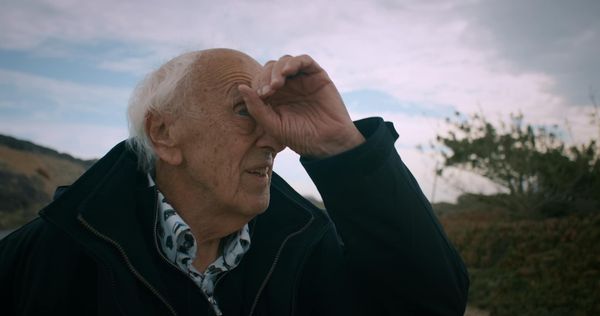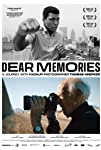Eye For Film >> Movies >> Dear Memories (2022) Film Review
Dear Memories
Reviewed by: Jennie Kermode

“What year is it?
He hazards a guess. “2013?” The mask which he is wearing tells us otherwise.

It has been three years since Thomas Hoepker’s Alzheimer’s diagnosis. His memory comes and goes now. It’s easier to recall the long ago past than things which happened recently. He’s still sharply intelligent, perceptive and witty, just missing some of the pieces which used to be there. The chances are that more will fall away. Fortunately, he has a convenient aide memoire – he spent much of his life as a photojournalist, with a particular love of capturing unique moments and taking pictures which tell stories.
Even if you’re not familiar with Hoepker’s work, the chances are that you will recognise some of his pictures. He still has what he believes to have been his very first: an image of an old woman in a snowstorm, a bent black clad figure in a whirl of white, taken with his father’s old plate camera. It’s a stunning piece of work for a beginner. Later he captured famous figures and famous moments – we see his pictures of ordinary US citizens reacting to the news of JFK’s assassination. It’s the personal things which matter most. He looks at a photograph of his landlady from the time when he first knew his wife, and a flood of recollections follows. An image taken on 11 September 2001 blurs the boundaries. He was on the wrong side of the Hudson River to capture the big story, but to a snap which, to his surprise, would go on to become iconic: a group of five young people sitting and chatting casually beside the riverbank whilst the Twin Towers burned in the background.
Documentary is a format which Hoepker can easily relate to, not just because of his photography career but because he and his wife and his wife Christine Kruchen have latterly worked as documentary producers from their home in New York. He seems more than usually at ease as director Nahuel Lopez follows the two of them on a cross country road trip in their RV. It’s something they’ve wanted to do for a long time and due to his health, it can’t be put off any longer, even if that does mean having to be extra careful because of the pandemic. It also means that the streets are much quieter than usual, which suits Hoepker down to the ground, as it makes it easier for him to stop and photograph the people who are out and about, and glean something of their stories.
He always saw himself as a storyteller, he says – just one working primarily with optical tools. The film’s narration is drawn from essays which he published over the years. The landscapes of the film are detailed like his photographs and one suspects that he had a hand in identifying interesting subjects. Sometimes Lopez films him taking photographs; at other times, Hoepker is at least as interested in talking to the strangers he meets, something he’s still quite capable of doing. He’s a good listener and one gets the impression that he doesn’t miss much.
During the drive, Hoepker and Kruchen listen to the radio, pleased to hear Biden making gains in the election. Commentary about Covid-19 – “The death toll in the US is nearly 245,000 people” – punctuate the film as we drive down long country roads, contributing to a haunting sense that Thomas is recording the world just before it dies. For him, it will soon fade, regardless of what happens to the rest of us. There is, however, none of the sadness which one might expect in such a tale. He has always lived for the moment, utterly immersed in the stuff of life, and the struggles which he faces now are just more interesting experiences. He soldiers on like the small dachshund who follows him on a walk through the woods bravely trying to carry a fallen branch three times his size, and one never doubts that him, it’s worth it.
“Of course I forget a lot, but not everything has to stay forever,” he says.
Dear Memories screened as part of the 2023 Glasgow Film Festival.
Reviewed on: 07 Mar 2023















